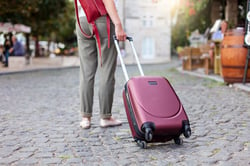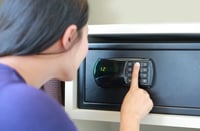Travel safety has recently gotten a significant amount of media attention. But it’s not just about physical safety. Whether you’re traveling across state lines or around...

the globe, financial safety is also a concern. Here’s a closer look at seven travel tips aimed at helping you protect your money this summer and throughout the year.
1. Travel light. Traveling heavy not only  makes you a target, but also means you've got more to lose. Prior to your trip, go through your wallet and take out everything you won't need while you're away.
makes you a target, but also means you've got more to lose. Prior to your trip, go through your wallet and take out everything you won't need while you're away.
Speaking of traveling light, carrying a lot of cash while traveling is ill-advised, but what if you don't use credit cards? Using a debit card can help you control spending while enjoying some protection against thieves.
2. Carry your money safely. Keeping all of your money in one place may seem convenient, but it’s also a recipe for disaster. Instead, divide your cash and store it in different places to prevent thieves from getting it all. This also means you’ll have money to get back to your hotel or to the police station, if necessary.
On-body, under-clothing storage accessories offer smart, secure spots for storage of money and small valuables, while travel purses, backpacks and other bags designed for travel have built-in anti-theft features.
3. Let your bank know your travel plans. Some banks  automatically reject unusual transactions, including those in out-of-the-ordinary locations. To avoid ending up in this situation, notify your bank of your destination and the length of your trip. Depending on the bank, you can do this by calling the number on the back of your debit card or via your online account or mobile app.
automatically reject unusual transactions, including those in out-of-the-ordinary locations. To avoid ending up in this situation, notify your bank of your destination and the length of your trip. Depending on the bank, you can do this by calling the number on the back of your debit card or via your online account or mobile app.
4. Set up transaction alerts. Pickpockets are sneaky, and you may not immediately notice if you’re a victim of identity theft or another type of financial fraud. Setting up transaction alerts for your debit card can help you know when your information has been compromised so that you can promptly alert the appropriate parties.
5. Have emergency numbers at the ready. If your debit card goes missing while you’re away from home, you won’t have access to it (or to your paper statements) for the number to call. Preparing a list of emergency phone numbers before you leave ensures that you’ll know who to call if you need assistance. Just keep in mind that 800-numbers don’t work outside of the US and Canada so make sure you’ve got the right digits.
6. Lock away valuables. Hotel rooms have in-room  safes for good reason: they are a simple way to safeguard your belongings. After checking in, take the extra time to lock away emergency cash, passports, and other valuables.
safes for good reason: they are a simple way to safeguard your belongings. After checking in, take the extra time to lock away emergency cash, passports, and other valuables.
7. Be proactive. While vacations may be relaxing, they can also lead to future headaches -- particularly if you don’t take a proactive approach to protecting your money. Rather than waiting for your monthly statement to arrive, review your purchases and withdrawals for any suspicious activity immediately upon your return.
One last thing to keep in mind about financial safety while traveling. While you’re on the road, the home and belongings you’ve left behind may be vulnerable. Avoid sharing information about your travel plans on social media to minimize risk while maximizing peace of mind.






